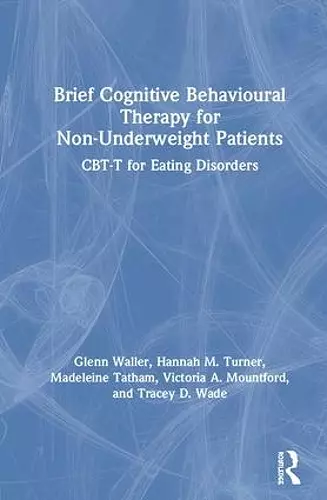Brief Cognitive Behavioural Therapy for Non-Underweight Patients
CBT-T for Eating Disorders
Tracey Wade author Glenn Waller author Madeleine Tatham author Hannah Turner author Victoria Mountford author
Format:Hardback
Publisher:Taylor & Francis Ltd
Published:29th May '19
Currently unavailable, and unfortunately no date known when it will be back
This hardback is available in another edition too:
- Paperback£28.99(9780367192297)

Most people with eating disorders struggle to find an effective therapy that they can access quickly. Brief Cognitive Behavioural Therapy for Non-Underweight Patients: CBT-T for Eating Disorders presents a new form of cognitive behavioural therapy (CBT) that is brief and effective, allowing more patients to get the help that they need.
CBT is a strongly supported therapy for all adults and many adolescents with eating disorders. This 10-session approach to CBT (CBT-T) is suitable for all eating disorder patients who are not severely underweight, helping adults and young adults to overcome their eating disorder. Using CBT-T with patients will allow clinicians to treat people in less time, shorten waiting lists, and see patients more quickly when they need help. It is a flexible protocol, which fits to the patient rather than making the patient fit to the therapy.
Brief Cognitive Behavioural Therapy for Non-Underweight Patients provides an evidence-based protocol that can be delivered by junior or senior clinicians, helping patients to recover and go on to live a healthy life. This book will appeal to clinical psychologists, psychiatrists, psychotherapists, dietitians, nurses, and other professionals working with eating disorders.
"Most services are restricted in the number of sessions that they can give to help people with eating disorders. Until now, clinicians have had no guidance about which of the established cognitive behavioural techniques (CBT) they should be delivering under such circumstances. This clear, focused book, written by experts in the field, guides clinicians through a ten session CBT intervention. It brilliantly describes the key methods, alongside the rationale for their use and provides clear examples and materials throughout. It addresses how to balance the use of the guide while ensuring flexibility to individual needs and responsiveness to weekly monitoring. It is essential reading for all clinicians working with eating disorders in the 21st Century." - Professor Roz Shafran, UCL Great Ormond Street Institute of Child Health
"This book makes a timely and significant contribution to the treatment of eating disorders. Firmly based on rigorous empirical research, it is innovative and clinically sophisticated. Cognitive behavioral therapy (CBT) is the most effective treatment for most eating disorders, but the reality is that a majority of patients do not receive quality evidence-based treatment. By providing a briefer, less costly, and more scalable form of CBT, this therapist-friendly treatment manual can help overcome the research-treatment gap. It is a must-read for professionals in the field of eating disorders." - Professor G. Terence Wilson, Oscar K Buros Professor of Psychology at Rutgers, the State University of New Jersey
"Most services are restricted in the number of sessions that they can give to help people with eating disorders. Until now, clinicians have had no guidance about which of the established cognitive behavioural therapy (CBT) techniques they should be delivering under such circumstances. This clear, focused book, written by experts in the field, guides clinicians through a 10-session CBT intervention. It brilliantly describes the key methods, alongside the rationale for their use, and provides clear examples and materials throughout. It addresses how to balance the use of the guide while ensuring flexibility to individual needs and responsiveness to weekly monitoring. It is essential reading for all clinicians working with eating disorders in the 21st Century." - Professor Roz Shafran, UCL Great Ormond Street Institute of Child Health, UK
"This book makes a timely and significant contribution to the treatment of eating disorders. Firmly based on rigorous empirical research, it is innovative and clinically sophisticated. Cognitive behavioral therapy (CBT) is the most effective treatment for most eating disorders, but the reality is that a majority of patients do not receive quality evidence-based treatment. By providing a briefer, less costly, and more scalable form of CBT, this therapist-friendly treatment manual can help overcome the research-treatment gap. It is a must-read for professionals in the field of eating disorders." - Professor G. Terence Wilson, Oscar K Buros Professor of Psychology at Rutgers, the State University of New Jersey, USA
ISBN: 9780367192273
Dimensions: unknown
Weight: 476g
222 pages